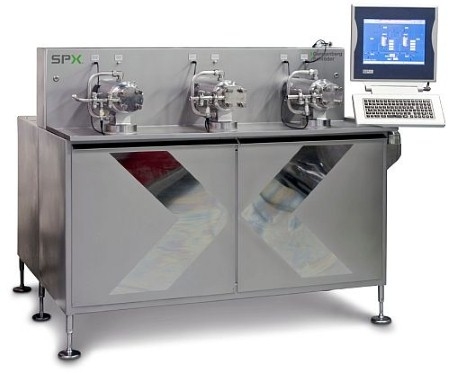 rg Schröder brand has developed pilot plants to test crystallized fat products like margarine, shortening and spreads as well as emulsified food products like mayonnaise, sauces and dressings. One of SPX’s key offerings for testing and development purposes is the Nexus pilot plant. Utilizing CO2 as cooling medium Nexus is a highly efficient, low-energy consuming scraped surface heat exchanger designed for various food products.
rg Schröder brand has developed pilot plants to test crystallized fat products like margarine, shortening and spreads as well as emulsified food products like mayonnaise, sauces and dressings. One of SPX’s key offerings for testing and development purposes is the Nexus pilot plant. Utilizing CO2 as cooling medium Nexus is a highly efficient, low-energy consuming scraped surface heat exchanger designed for various food products.The Nexus pilot plant has been proven to bring much greater efficiency in the production of viscous products such as margarine. Uniquely, it uses the natural refrigerant CO2 - which has less environmental impact and provides significant energy saving over traditional cooling media like i.e. Freon or Ammonia. The plant provides everything needed for optimal small-scale production with product pressures up to 120 bar and has all the flexibility one would expect from a pilot system – enabling fast set-up and alterations to meet process and applications as needed.
The unique design of the plant ensures the efficient cooling created by the use of CO2. This enables to influence the crystallization of the product even better compared to systems operated with Freon or Ammonia - properties that greatly enhance the quality of certain fats and margarines. Compared to other refrigerants CO2 operated systems require much less energy to produce the same amount of product, making the process significantly more efficient. Further energy savings are realised as the CO2 compressor within the Nexus pilot plant has a heat recovery system, which makes available heat from the process for other purposes. Overall Nexus pilot plants, and indeed Nexus production scale units, reduce the power consumption per ton of produced product by up to 40% compared to the use of other refrigerants.
CO2 not only provides a more efficient, higher capacity cooling process, it is a less expensive commodity and does not have the environmental and safety issues associated with the use of the traditional NH3 (ammonia) or Freon refrigerants. It does not have regulated usage nor is it poisonous or flammable, making safety procedures straightforward.
The Nexus pilot solution is in line with the full production Nexus solution, ensuring the same conditions and repeatable results for the move to large-scale production facilities. Applications in challenging areas such as pastry margarine have proven successful scale-up from pilot to production with improved competitive advantage of the final product quality been seen through to the bakeries.
The Nexus pilot plant is a modular unit based on a table design. It has flexible connection pipes to easily connect various units for maximum versatility. It has a hygienic, streamlined design enabling easy cleaning and maintenance. It is ideal for manufacturers looking for a flexible, effective and highly efficient crystallization and cooling small-scale process for various kinds of food products.





